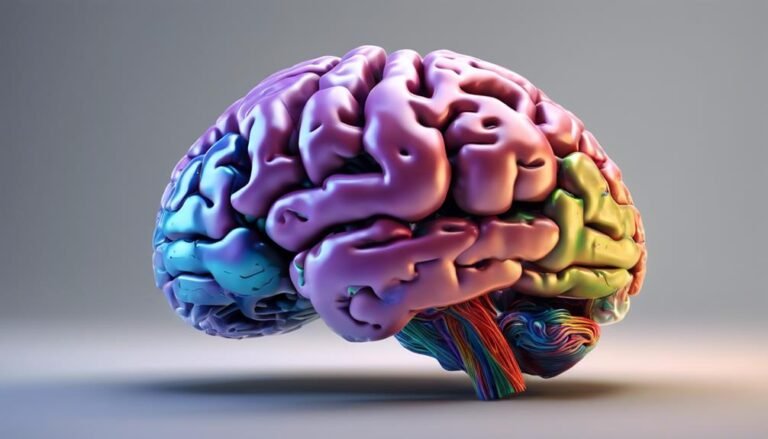Personality and Conflict Resolution in Relationships
When it comes to relationships, your personality traits can have a substantial impact on how conflicts are resolved. Understanding how your unique characteristics influence your approach to resolving disagreements is key to fostering healthier interactions with your partner. By recognizing the role personality plays in conflict resolution, you can better navigate challenging situations and strengthen the bond you share. Ready to explore how personality dynamics can shape conflict resolution strategies in your relationships?
Key Takeaways
- Personality traits influence conflict styles and communication patterns.
- Recognizing differences in personality aids in adapting conflict resolution approaches.
- Awareness of one's tendencies in conflict leads to better outcomes.
- Conscious efforts to improve conflict engagement can be made through understanding personality traits.
- Enhancing conflict resolution skills is achieved through respecting each other's personality traits.
Personality Traits and Conflict Resolution
Understanding your own and your partner's personality traits is crucial for effective conflict resolution in relationships. Personality traits play a significant role in how individuals approach and handle conflicts. Each person has unique characteristics that influence their conflict styles and communication patterns. By recognizing these traits in yourself and your partner, you can navigate disagreements more constructively.
Different personality traits can impact how individuals respond to conflicts. For example, someone with a more assertive personality may be direct in their communication during disagreements, while a person with a more passive personality might avoid confrontation altogether. Understanding these differences can help you appreciate where your partner is coming from and adapt your approach accordingly.
Moreover, being aware of your own tendencies in conflict situations can also lead to better outcomes. Recognizing how your personality traits influence your conflict style and communication patterns allows you to make conscious efforts to improve how you engage in disagreements. By understanding and respecting each other's personality traits, you can enhance your conflict resolution skills and strengthen your relationship.
Communication Styles in Relationships
When contemplating communication styles in relationships, it's crucial to take into account the balance between verbal and nonverbal cues. Understanding the differences between direct and indirect communication can assist you in navigating conflicts more effectively.
Being mindful of how you express yourself can result in clearer and more constructive conversations with your partner.
Verbal Vs Nonverbal Communication
Effective communication in relationships involves a delicate balance between verbal and nonverbal cues. Body language and tone of voice play vital roles in conveying your thoughts and feelings to your partner. Your body language, such as facial expressions, gestures, and posture, can often speak louder than words. It can show whether you're open and engaged or closed off and defensive.
Similarly, your tone of voice can communicate a range of emotions – from warmth and understanding to frustration and anger.
Being mindful of your nonverbal cues can enhance the overall effectiveness of your communication. For instance, maintaining eye contact can demonstrate attentiveness and respect, while crossing your arms may signal defensiveness.
Paying attention to your partner's body language and tone of voice can also provide valuable insights into their feelings and intentions. By being aware of these nonverbal signals, you can foster better understanding and connection in your relationship.
Direct Vs Indirect Communication
Using direct or indirect communication styles in relationships can greatly impact how effectively you convey your thoughts and feelings to your partner. When it comes to cultural differences, understanding how direct or indirect communication is perceived in your partner's culture can help bridge potential misunderstandings.
For instance, in some cultures, direct communication may be seen as confrontational, while in others, it can be a sign of honesty and transparency. Gender dynamics also play a role in communication styles, with societal expectations often influencing how individuals express themselves. It's important to be mindful of these nuances and adapt your communication style accordingly.
If you tend to lean towards direct communication, consider the impact your words may have on your partner, especially if they prefer a more indirect approach. Similarly, if you typically use indirect communication, try to find a balance that allows you to express yourself clearly while also considering your partner's preferences.
Emotional Intelligence Impact on Conflict
Improving your emotional intelligence can greatly impact how you navigate and resolve conflicts within your relationships. Emotional intelligence plays an essential role in understanding your own emotions and those of others, which is important in managing conflicts effectively.
When you're attuned to your emotions and can express them in a healthy way, you're better equipped to communicate your needs and listen empathetically to your partner's perspective.
In relationship dynamics, emotional intelligence allows you to recognize triggers that escalate conflicts and helps you regulate your responses in a more constructive manner. By being aware of your emotions and the impact they can have on your interactions, you can approach disagreements with a calmer demeanor and seek solutions collaboratively.
Developing your emotional intelligence also enhances your ability to show empathy and validate your partner's feelings, fostering a more supportive and understanding environment for resolving conflicts.
Problem-Solving Approaches in Relationships
Managing conflicts in relationships can be greatly enhanced by adopting effective problem-solving approaches that promote understanding and collaboration between partners. When faced with challenges, utilizing conflict resolution tactics can help navigate through differences in a pivotal manner.
One key aspect of relationship problem solving is active listening. By truly hearing your partner's perspective without interrupting or formulating a response in your mind, you show respect and create space for mutual understanding.
Another valuable approach is to focus on the issue at hand rather than resorting to personal attacks. Addressing the specific problem allows both partners to work together towards finding a solution without escalating emotions.
Additionally, practicing empathy plays an essential role in successful conflict resolution. Putting yourself in your partner's shoes and acknowledging their feelings can foster a deeper connection and pave the way for compromise.
Conflict Resolution Strategies for Couples
Let's talk about some key strategies for resolving conflicts in your relationship.
Active listening techniques can help you truly understand your partner's perspective.
Building trust together and being open to compromise and understanding are essential steps towards finding common ground and strengthening your bond.
Active Listening Techniques
To enhance communication and foster understanding in your relationship, practicing active listening techniques is vital for effective conflict resolution. Active listening involves truly focusing on what your partner is saying, without interrupting or formulating your response while they speak.
By demonstrating active listening, you show your partner that you value their thoughts and feelings, which can help de-escalate conflicts and promote a healthier dialogue.
Effective communication skills are essential when employing active listening techniques. It's important to maintain eye contact, nod to show you're engaged, and provide verbal affirmations to demonstrate your understanding. Reflecting on what your partner has expressed by paraphrasing their words can also confirm that you're actively listening and comprehending their perspective.
Building Trust Together
Fostering trust in your relationship is a key aspect of managing conflicts and strengthening your bond with your partner. Trust building is a continuous process that requires effort from both individuals in the relationship.
Communication plays an important role in establishing trust. Make sure to be open and honest with each other, share your thoughts and feelings, and actively listen to your partner's perspective.
To build trust, it's important to follow through on your promises and commitments. Consistency in your actions will show your partner that they can rely on you. Additionally, being reliable and dependable contributes greatly to relationship growth. Show your partner that you're there for them, especially during challenging times.
Creating a safe and supportive environment where both of you feel comfortable expressing yourselves is crucial. Trust is the foundation that allows you to navigate conflicts effectively and grow together as a couple.
Compromise and Understanding
One key strategy for resolving conflicts in relationships is finding compromises and seeking mutual understanding. Developing strong compromise skills is vital in fostering healthy relationship dynamics. It involves a give-and-take approach where both partners actively listen, empathize, and work towards a solution that satisfies both parties.
To achieve this, emotional understanding plays a pivotal role. It's important to recognize and validate each other's feelings, even if you don't necessarily agree with them. By acknowledging and respecting each other's emotions, you can create a safe space for open communication and constructive conflict resolution.
In the intricacies of relationship dynamics, conflicts are inevitable. However, how you navigate and resolve these conflicts can greatly impact the strength and longevity of your relationship. By prioritizing compromise and understanding, you not only address immediate issues but also lay a foundation for a deeper connection built on empathy and mutual respect.
Understanding Different Conflict Styles
Understanding the various conflict styles individuals exhibit can greatly enhance your ability to navigate disagreements in a relationship effectively. Conflict resolution styles vary among people due to their unique personality dynamics. Some individuals may prefer avoiding conflicts altogether to maintain peace, while others might confront issues head-on to address them immediately.
Understanding these differences can help you approach conflicts in a way that resonates with your partner's style. By recognizing whether you lean towards a competitive, collaborative, compromising, accommodating, or avoiding conflict style, you can adapt your approach to better suit the situation.
Recognizing these differences doesn't mean compromising your own values or needs but rather finding a middle ground where both parties feel heard and respected. Open communication about your conflict resolution preferences and understanding your partner's as well is crucial. Embracing these differences with empathy and patience can lead to more effective conflict resolution and strengthen the bond between you and your partner.
Personality Compatibility in Resolving Conflicts
Managing conflicts in relationships becomes smoother when considering how personality compatibility influences your approach to resolving disagreements. Personality dynamics play a significant role in how individuals navigate conflicts, as each person brings their unique traits, communication styles, and emotional responses to the table.
When partners have compatible personalities, conflict management can be more effective, leading to better outcomes and strengthened relationships.
Understanding each other's personality dynamics can help you anticipate how the other person might react in a conflict situation. For example, if one partner tends to avoid confrontation while the other is more assertive, knowing these traits can guide you in finding a balanced approach to resolving disagreements.
By recognizing and respecting each other's personality differences, you can work towards a more harmonious conflict resolution process.
Effective conflict management involves leveraging your personalities to communicate openly, listen actively, and find mutually beneficial solutions. By aligning your conflict resolution strategies with your compatibility, you can foster a healthier and more understanding relationship.
Overcoming Conflict With Empathy
Managing conflicts in relationships can be challenging, but overcoming them with empathy can pave the way for deeper understanding and stronger connection. Empathy practice is a powerful tool in conflict resolution, as it involves actively listening to your partner's feelings and perspectives without judgment. By putting yourself in their shoes, you can gain insight into their emotions and motivations, which can help prevent conflicts from escalating.
Conflict prevention is essential in maintaining a healthy and harmonious relationship. When you approach disagreements with empathy, you demonstrate that you value your partner's feelings and are willing to work together to find a solution. This can create a safe space for open communication and mutual respect.
Strengthening Relationships Through Conflict Resolution
To build stronger relationships, managing conflicts with empathy and effective communication is essential. Conflict prevention and emotional awareness play pivotal roles in nurturing healthy relationships. By addressing issues early on and being attuned to your own and your partner's emotions, you can prevent conflicts from escalating and causing long-term damage.
Relationship building is a continuous process that requires patience and understanding. Conflict management is an indispensable aspect of this process. When conflicts arise, approach them with a mindset of finding mutual understanding and resolution. Effective communication is crucial in expressing your feelings and listening to your partner's perspective.
Conclusion
To sum up, understanding personality traits and communication styles can greatly impact conflict resolution in relationships. By acknowledging differences and leveraging strengths, couples can navigate disagreements effectively.
Through empathy and problem-solving approaches, conflicts can be overcome, strengthening the bond between partners. Remember, conflicts are opportunities for growth and deeper connections.
So, embrace the challenges, communicate openly, and work together to build a harmonious and fulfilling relationship.







